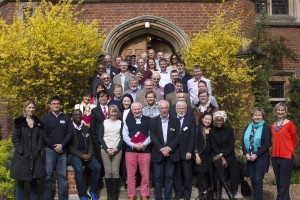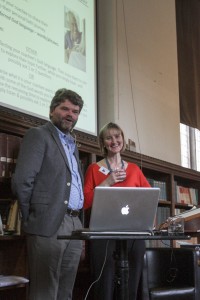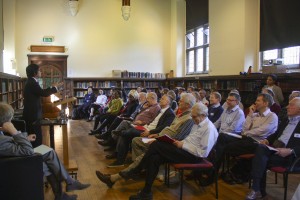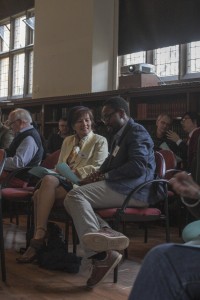31 March – 2 April 2017

Group Photo
The Faith in Business conference invariably features stimulating input and invigorating fellowship. What was especially striking at this year’s conference was the high degree of honesty, vulnerability and integrity shown by the speakers. At least two of them were moved to tears in the course of speaking – a reminder that business is a sphere which arouses strong emotions, where people experience highs and lows and find themselves angry and upset as well as joyful and excited.
Making a Difference in the Developing World
Richard Leftley got the conference off to a rousing start with a memorable talk on Friday evening. He gave up a comfortable life in the City when in his late 20s. He was challenged by a visit to Zambia and met a woman who was thrown into extreme poverty when her husband died suddenly. He realised that for many people who live in the Global South, life resembles a game of snakes and ladders – there are some very long snakes you can fall down. Richard realised that the vast majority of people in Africa and Asia (97% at that time) have no insurance system to fall back on. He felt called by God to go about providing one.
MicroEnsure’s website proclaims Richard’s philosophy:
‘We know that our customers don’t wake up in the morning wanting to purchase insurance, but they do wake up worrying about the risks they face each day. That’s why I started MicroEnsure, to help those people around the world who need it most should bad things happen to them.’
Initially, progress was slow. MicroEnsure signed up 50,000 clients in the first three years, and 1 million in the first ten years. It was a hard struggle; Richard even relocated to the US for a while to be closer to large sources of finance, and eventually received $25 million from the Bill Gates Foundation. He realised that the key to a breakthrough revolved round three things: trust, accessibility, and a regular system of payments. For a time he offered insurance free, and once poor people realised its value and the reliability of his company, they were prepared to pay for the service. MicroEnsure now has 43 million clients. They offer a very fast service, settling claims quickly and with a minimum of questions. Unlike most insurance systems it is not riddled with exceptions, exclusions and fine print. A small minority of clients may submit false claims, but the organisation has become adept at detecting large-scale or systematic fraud.
Richard feels God’s pleasure in what he does: ‘when I sell insurance to poor people it brings great pleasure to God’. He wishes more people in his own church appreciated the positive role that businesses like his play in the world. But success has come at a price. Richard said he had been home for 17 days in three months, because he spends a lot of time visiting the 16 countries where MicroEnsure operates. Now 43, he admitted ‘I am exhausted’, and doesn’t think he can continue for more than another three or four years. But what a legacy he will leave!
Making a Difference through Innovation with Integrity
On Saturday morning we had the pleasure of listening to Phil Staunton, who like Richard lives in Cheltenham. He is Managing Director of D2M Innovation, D2M standing for Design to Market. This is a specialist innovation company which helps other companies to develop, prototype, manufacture and protect new concepts. It therefore covers the entire process of bringing a bright idea to fruition. In Phil’s words, what D2M offers is ’a one-stop shop for the concept right the way through to patenting, package, branding and products on the shop shelves’. D2M do styling, computer design work, sourcing of a manufacturer, testing and modification of design.
Getting D2M to its present position has not been easy. Phil talked honestly and movingly about many painful steps along the way. He worked with a partner who – he became convinced – lacked integrity, and then after a parting of the ways poached some of Phil’s staff from him. Phil’s experiences have led him to reflect deeply about the nature of integrity in business. One aspect of integrity is being honest with clients about the viability of their ideas – it doesn’t actually help to string them along with false pretences. He is also willing to forego repeat business because of a client’s perceived lack of integrity. Other key components of integrity are:
-
Not under-charging customers, because this puts unfair pressure on designers to cut corners
-
The simple but demanding practice of doing what you’ve said you’ll do – ‘we lie more often than we think’
-
The need to be teachable and open to criticism oneself
-
Being careful about working with friends and family, though not doing so is a ‘rule’ which Phil admitted he’d broken
-
Not shying away from confrontation, something Phil admitted he found difficult
-
Not bad-mouthing other companies – notably ones that had cheated him – but redoubling efforts to retain or win customers.
Many conference delegates said this was the best talk on business integrity they’d ever heard, because unlike many, it did not repeat moral platitudes but dealt honesty with real challenges.
Phil is motivated by a desire to ‘see people achieve their potential, whether that be as staff who work for me, as clients, so that their new innovative ideas achieve their market potential, or as suppliers, ensuring that they are doing all that they possibly can’. He wants to see all of them flourish, ‘even if they don’t know God or are unaware that what’s within them has come from him’.
Making a Difference through Christ-Centred Coaching
 Helping people unpack their potential is also at the heart of the work of Carole Rutherford-Milligan and David Wetton, who spoke during the second half of Saturday morning about Christ-Centred Coaching. They see coaching as helping people move from where they are now to where they want to be. Unlike mentoring, which is about ‘push’ (fixing and advising), coaching is more about ‘pull’ (asking and listening). The Bible is full of probing questions, starting with God’s question to Adam ‘Where are you?’ and including Jesus’s ‘Who do you say that I am?’ In working with Christians, Carole and David find that they are often in the business of helping people connect with the Holy Spirit, who has had a powerful impact on their own lives. This is often about releasing innate wisdom rather than providing neat solutions. It also involves times of spiritual battle – they talked movingly of the ‘dark night of the coaching soul’.
Helping people unpack their potential is also at the heart of the work of Carole Rutherford-Milligan and David Wetton, who spoke during the second half of Saturday morning about Christ-Centred Coaching. They see coaching as helping people move from where they are now to where they want to be. Unlike mentoring, which is about ‘push’ (fixing and advising), coaching is more about ‘pull’ (asking and listening). The Bible is full of probing questions, starting with God’s question to Adam ‘Where are you?’ and including Jesus’s ‘Who do you say that I am?’ In working with Christians, Carole and David find that they are often in the business of helping people connect with the Holy Spirit, who has had a powerful impact on their own lives. This is often about releasing innate wisdom rather than providing neat solutions. It also involves times of spiritual battle – they talked movingly of the ‘dark night of the coaching soul’.
Carole and David split delegates into pairs to carry out the following exercise. The coachee selected a work-related topic that he or she would like to make some progress on, in alignment with their personal walk with God. The coach asked some leading questions to help them share, in particular noting they way the coachee talked and thought about God. The coach then had the option either of praying about the topic with the coachee, or summarising what it is they wanted to make progress on, leading to some fruitful discussion. The pairs then swapped roles. Although not all found it easy, many reported that the exercise had been very useful, even – or especially! – when done with partners who were complete strangers.
Making a Difference in Chinese Business Education
 Revived by an hour and a half’s break after lunch, we gathered again at 3.15 to hear an inspirational talk from Chinese speaker Moses Cui. He was accompanied by his friend and colleague from Geneva, Christoph Stückelberger, and a group of 12 Chinese entrepreneurs. (They attended specifically for this session, having visited several local Cambridge companies run by Christians the previous day.) Moses is Director of the Kingdom Business College, which has trained over 5000 emerging Christian entrepreneurs since 2009. He is also a Professor of Economics at two universities in Beijing, as well as a founder and director of several companies. Moses said that faith and business are intermingled like Chinese chopsticks. Although there are strong pressures to keep them apart, his goal is to bring them together. Interestingly, even before he was a Christian, he was attracted to the name ‘Gospel Company’; he then discovered ‘Gospel’ meant ‘Good News’ and, more important, what the content of the good news was. Moses looks and works for a reformation in business so that it is Christ-centred, human-centred, performance-centred, creation-centred and society-centred: a truly holistic vision. Richard Higginson will be returning the compliment and visiting China in September, to explore and learn more of what Christian entrepreneurship means in a Chinese context.
Revived by an hour and a half’s break after lunch, we gathered again at 3.15 to hear an inspirational talk from Chinese speaker Moses Cui. He was accompanied by his friend and colleague from Geneva, Christoph Stückelberger, and a group of 12 Chinese entrepreneurs. (They attended specifically for this session, having visited several local Cambridge companies run by Christians the previous day.) Moses is Director of the Kingdom Business College, which has trained over 5000 emerging Christian entrepreneurs since 2009. He is also a Professor of Economics at two universities in Beijing, as well as a founder and director of several companies. Moses said that faith and business are intermingled like Chinese chopsticks. Although there are strong pressures to keep them apart, his goal is to bring them together. Interestingly, even before he was a Christian, he was attracted to the name ‘Gospel Company’; he then discovered ‘Gospel’ meant ‘Good News’ and, more important, what the content of the good news was. Moses looks and works for a reformation in business so that it is Christ-centred, human-centred, performance-centred, creation-centred and society-centred: a truly holistic vision. Richard Higginson will be returning the compliment and visiting China in September, to explore and learn more of what Christian entrepreneurship means in a Chinese context.
Making a Difference in Banking
Following tea, Antony Elliott spoke about Making a Difference in Banking. The former Group Risk Director of a major bank, he spoke with refreshing candour, apologising for much of what has gone on in the banking sector. He first became concerned about what banks were or weren’t doing when he carried out some research on personal debt, culminating in the report Not Waving but Drowning: Over-indebtedness by Misjudgment in 2006. The 2008 financial crisis highlighted what a huge problem debt had become, and prompted Antony to set up the Fairbanking Foundation, aimed at changing the practices and ultimately the culture of UK banking. This has helped members of the public to organise their finances better, and issued certificates (the Fairbanking Mark) to banks with products and services that genuinely help the public rather than exploit their financial weakness or foolishness. Progress has been slower than Antony would like – he said ‘it had been a tough and lonely journey for a long time’ – but he did believe that on balance financial institutions were improving. His talk provoked an interesting variety of responses, with some expressing shock that he was having to fill a gap that the regulator was failing to meet, and another saying ‘You feel a sense of redemption having been part of the mess’. Antony explained that his Christian faith had sustained him throughout this demanding process, with personal retreats and spiritual practices playing an important role. He read snippets from a prayer journal which he had kept since 2008, including observations that he was on a tightrope where it was impossible to turn round.
Making a Difference in the Performance Culture
After an evening meal replete with lively conversation, we listened to former Hewlett Packard Director Paul Valler talk about the pitfalls of a working world that relentlessly pursues the maximisation of performance. These days organisations are obsessed by what they can measure, especially financial measurements. His own company, HP (like Apple) experienced a decisive change when it was sold into public ownership: both companies were much more product- and service-focussed to start with. Paul observed that ‘whatever measure leaders focus on becomes the main purpose for their organisation’, and ‘whatever is easy to measure gets put to the head, rather than what’s tough to measure but may actually be more important’. He thinks that an organisation’s higher purpose can rarely be assessed with a single measure, and quoted the economist Charles Goodhart: ‘when a measure becomes a target it ceases to be a useful measure’. He commended instead the use of the balanced scorecard, a focus on quality of relationships and an alignment with Kingdom purposes. His talk was grounded in a theology of grace which emphasises that our identity as Christians is based on God’s unconditional acceptance; this in turn leads to a secure identity and acts of loving service, with a capacity to cope with failure as well as success in the world’s eyes. Paul encouraged us all to join in an ‘I Renounce’ prayer refusing to give in to the pressures of a performance culture. As Chair of the London Institute for Contemporary Christianity, he also drew attention to the latter’s Fruitfulness on the Frontline initiative which is having a major impact on Christians’ whole-life discipleship.
Making a Difference as Christian Entrepreneurs

Delegates in Discussion
On Sunday morning Kina Robertshaw and Richard Higginson provided a taster for their forthcoming book A Voice to be Heard. Based on Kina’s interviews with 50 Christian entrepreneurs, this demonstrates the major contribution they are making through their work. Several of the interviewees were present at the conference; they included Richard Leftley and Phil Staunton. Kina and Richard talked about the way they felt God had guided them, their positive experience of working together, the process of carrying out the interviews and the main findings to emerge from the research. They shared how all the entrepreneurs felt they were contributing to the building of God’s kingdom, but varied in how they understood this: for some it was in terms or providing an excellent product or service, for some practising high standards of business ethics, for some openly sharing their faith with staff and customers, for others using their wealth to give generously to worthy causes. The book concludes that entrepreneurs have a key role to play in the church’s mission, and that the church needs to wake up to this, including entrepreneurs in their vision and strategy instead of marginalising them. The book will be published by IVP on September 21; look out for invitations to a book launch!
Making a Difference Further Afield
A plenary session which followed provided opportunity for several delegates running ‘faith and business’ ministries round the country to share what they are doing. These included:
-
Paul Milbank (Business Connect, Jersey)
-
Steve Bavington (Chaplaincy Plus, Birmingham)
-
Chris Gillies (Christian Business Leaders Network, Oxford)
-
Mo Trudel (Ministry at Work, Staffordshire)
-
Peter Heslam (Transforming Business, Cambridge)
-
Helen Howe (SALT, Christian Aid)
Michael Scott, a conference regular who was away doing a long-distance charity run raising money for orphans in Sierra Leone, found time to pop in and do his annual update of the Faith in Football programme, bringing along several local schoolchildren who entertained us with their entrepreneurial exploits.
A Faith in Business conference always ends on a note of spiritual challenge with a service of Eucharist in the college chapel. On this occasion David Ball preached from Colossians 3 and Matthew 20. We gathered round the Lord’s table and parted with a fresh resolve to go out into the world and serve God with integrity and vigour.
Next year will be the last Faith in Business conference I organise at Ridley Hall. The dates are 13-15 April 2018. Do come along and join us then!